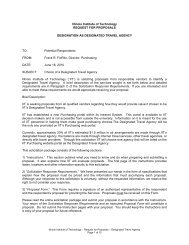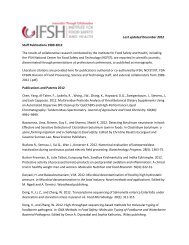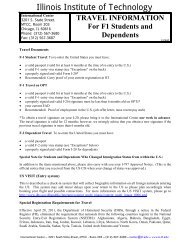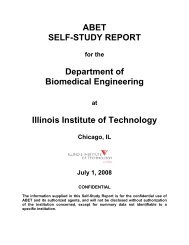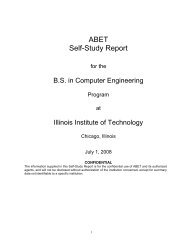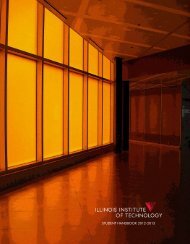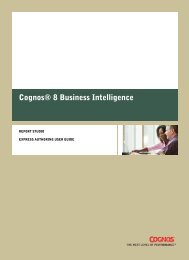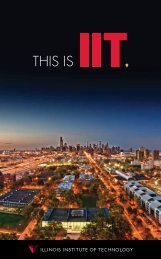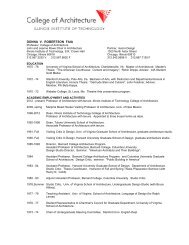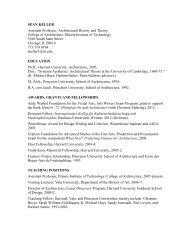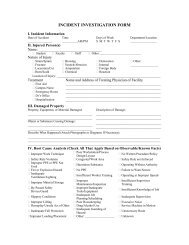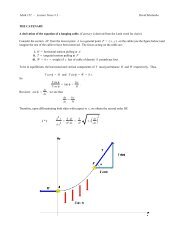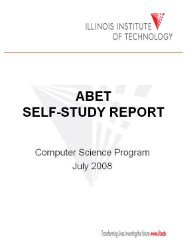Copyright & Disclaimer Information - Illinois Institute of Technology
Copyright & Disclaimer Information - Illinois Institute of Technology
Copyright & Disclaimer Information - Illinois Institute of Technology
Create successful ePaper yourself
Turn your PDF publications into a flip-book with our unique Google optimized e-Paper software.
214<br />
Course Descriptions<br />
SOC 321<br />
Social Inequality<br />
Evaluates the patterns and dimensions<br />
<strong>of</strong> social, economic, and political<br />
inequality in American society and<br />
how these compare with other societies;<br />
who gets ahead and why; the<br />
relationship <strong>of</strong> social class to other<br />
features <strong>of</strong> society; some consequences<br />
<strong>of</strong> social stratification; and outlooks<br />
for the future <strong>of</strong> inequality in the<br />
United States. Same as PS 321.<br />
(3-0-3) (S) (C)<br />
SOC 340<br />
Social Organization and Control<br />
This course surveys theories explaining<br />
the organization and structure <strong>of</strong><br />
complex societies. The problem <strong>of</strong><br />
social control, or the capacity <strong>of</strong> a<br />
society to formally or informally regulate<br />
itself according to its desired<br />
principles, is viewed as a central<br />
problem <strong>of</strong> social organization.<br />
Prerequisite: A 200-level or higher<br />
Social Science course. Same as PS 340.<br />
(3-0-3) (S) (C)<br />
SOC 348<br />
Deviant Behavior and Conformity<br />
Analyzes the definition, development,<br />
and control <strong>of</strong> deviant behavior in<br />
relation to social processes. Societal<br />
reaction to and the amount, distribution,<br />
and behavior systems <strong>of</strong> various<br />
forms <strong>of</strong> deviance (drug addiction, suicide,<br />
crime, alcoholism, illegitimacy,<br />
etc.) are examined. (3-0-3) (S) (C)<br />
SOC 350<br />
Urban Sociology<br />
The course examines the historical<br />
origin <strong>of</strong> cities and their present<br />
place in society and culture.<br />
Important themes in the modern discourse<br />
on urban areas include the<br />
impact <strong>of</strong> industrialization and globalization,<br />
the significance <strong>of</strong> racial,<br />
ethnic, and economic structures, and<br />
the consequences <strong>of</strong> residential segregation<br />
and alternative physical<br />
structures <strong>of</strong> urban areas. The course<br />
includes a short fieldwork assignment<br />
that introduces student to<br />
qualitative methods for studying<br />
urban life. While the course focuses<br />
on urbanization within the US, comparative<br />
perspectives with other<br />
urban areas around the world are<br />
<strong>Copyright</strong> & <strong>Disclaimer</strong> <strong>Information</strong>: <strong>Copyright</strong> © 1994, 1995, 1996, 1997, 1998, 1999, 2000, 2001, 2002, 2003, 2004, 2005, 2006, 2007. CollegeSource®, Inc. and Career Guidance Foundation. CollegeSource® digital catalogs are derivative works owned and copyrighted by CollegeSource®, Inc. and Career Guidance Foundation. Catalog content is owned and copyrighted by the appropriate school. While CollegeSource®, Inc. and Career Guidance Foundation provides information as a service to the public, copyright is retained on all digital catalogs.<br />
<strong>Copyright</strong> & <strong>Disclaimer</strong> <strong>Information</strong>: <strong>Copyright</strong> © 1994, 1995, 1996, 1997, 1998, 1999, 2000, 2001, 2002, 2003, 2004, 2005, 2006, 2007. CollegeSource®, Inc. and Career Guidance Foundation. CollegeSource® digital catalogs are derivative works owned and copyrighted by CollegeSource®, Inc. and Career Guidance Foundation. Catalog content is owned and copyrighted by the appropriate school. While CollegeSource®, Inc. and Career Guidance Foundation provides information as a service to the public, copyright is retained on all digital catalogs.<br />
encouraged. Prerequisite: A 200-level<br />
or higher Social Science course.<br />
(3-0-3) (S) (C)<br />
SOC 351<br />
Sociology <strong>of</strong> Work<br />
This is an introductory-level course<br />
in the sociology <strong>of</strong> work. We begin<br />
with a brief comparison <strong>of</strong> the<br />
nature, role, and meaning <strong>of</strong> work<br />
across time and space. We continue<br />
with a survey <strong>of</strong> some <strong>of</strong> today’s most<br />
important topics in the study <strong>of</strong><br />
work, primarily looking at the<br />
United States. These include: work<br />
as a source <strong>of</strong> social power; the workplace<br />
as a microcosm; organizational<br />
structure and culture; varieties <strong>of</strong><br />
work arrangements; occupations and<br />
pr<strong>of</strong>essions; management; daily life<br />
in the workplace; technology in the<br />
workplace; the importance <strong>of</strong> work<br />
for identity and family life; gender<br />
and race at work; workplace policies<br />
and legislation; and the future <strong>of</strong><br />
work in our society. Prerequisite: A<br />
200-level or higher Social Science<br />
course. (3-0-3) (S) (C)<br />
SOC 352<br />
Sociology <strong>of</strong> Education<br />
Analyzes the organization and purpose<br />
<strong>of</strong> schooling in American society,<br />
including the historical development <strong>of</strong><br />
American education; the relationship<br />
<strong>of</strong> schooling to life chances and individual<br />
success; the bureaucratic characteristics<br />
<strong>of</strong> schooling; contemporary<br />
problems facing American education<br />
and proposals recommended for their<br />
solution; and how the U.S. educational<br />
system compares with those <strong>of</strong> other<br />
societies. Prerequisite: A 200-level or<br />
higher Social Science course. (3-0-3)<br />
(S) (C)<br />
SOC 353<br />
The Promise and Problems <strong>of</strong> Policy<br />
This course analyzes the policy making<br />
process including both policy formulation<br />
and implementation.<br />
Subjects covered include the necessity<br />
for policy, environmental factors<br />
and their effect on policymaking, the<br />
process <strong>of</strong> policymaking and a brief<br />
introduction to methods <strong>of</strong> analysis.<br />
Material included covers both theory<br />
and an examination <strong>of</strong> the factors<br />
that must be considered and the<br />
IIT Undergraduate Bulletin 2006–2008<br />
problems that arise in applying the<br />
theoretical material to the practice<br />
<strong>of</strong> solving actual problems.<br />
Prerequisite: At least one social science<br />
course. Same as PS 353. (3-0-3)<br />
(S) (C)<br />
SOC 354<br />
Urban Policy<br />
Course explores major dilemmas facing<br />
cities today including changing<br />
economic and tax bases, fiscal stresses,<br />
immigration, marginalized populations,<br />
new forms <strong>of</strong> consumption<br />
and adaptation to structural change.<br />
Responses <strong>of</strong> politicians to pressures<br />
to develop new policies and leverage<br />
the productive capacity <strong>of</strong> the city<br />
and the impact <strong>of</strong> citizen preferences<br />
will be analyzed. Prerequisite: At<br />
least one social science course. Same<br />
as PS 354. (3-0-3) (S) (C)<br />
SOC 355<br />
Political Sociology<br />
Surveys major issues and problems<br />
in political sociology, including the<br />
forms <strong>of</strong> political power structures,<br />
elitist approaches to politics, community<br />
and national power structure,<br />
voting behavior, nation building and<br />
modernization, and civil-military<br />
relations. Same as PS 355. (3-0-3)<br />
(S) (C)<br />
SOC 356<br />
Transformative Technologies<br />
Technological innovations commonly<br />
have widespread effects within a<br />
society. A handful <strong>of</strong> technologies,<br />
however, have such a pr<strong>of</strong>ound<br />
impact on social institutions and culture<br />
that they can be considered<br />
“transformative” for the societies in<br />
which they are adopted. Examples<br />
include writing, the plow, the clock,<br />
the automobile and the computer.<br />
This course focuses on such technologies,<br />
typically one per semester, and<br />
charts the social transformations<br />
that have historically accompanied<br />
their introduction. Attention will be<br />
directed to issues <strong>of</strong> institutional<br />
interdependence, the question <strong>of</strong><br />
technological determinism, and luddism/resistance.<br />
Prereuisite: A 200level<br />
or higher Social Science course.<br />
(3-0-3) (S) (C)



